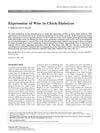 112 citations,
January 2014 in “Molecular and cellular therapies”
112 citations,
January 2014 in “Molecular and cellular therapies” Blocking the Wnt pathway could lead to new treatments for cancer and tissue repair but requires careful development to avoid side effects.
[object Object]  75 citations,
March 2014 in “Journal of Investigative Dermatology”
75 citations,
March 2014 in “Journal of Investigative Dermatology” Aging mice have slower hair regeneration due to changes in signal balance, but the environment, not stem cell loss, controls this, suggesting treatments could focus on environmental factors.
 13 citations,
January 2010 in “Advances in Biochemical Engineering / Biotechnology”
13 citations,
January 2010 in “Advances in Biochemical Engineering / Biotechnology” Understanding hair biology is key to developing better treatments for hair and scalp issues.
 November 2023 in “International Journal For Multidisciplinary Research”
November 2023 in “International Journal For Multidisciplinary Research” Herbal hair oil made with natural ingredients helps reduce hair loss, dandruff, and graying.
 November 2022 in “Research Square (Research Square)”
November 2022 in “Research Square (Research Square)” Seasonal changes affect hair growth genes in Angora goats, possibly influencing mohair quality.
 6 citations,
July 2007 in “Developmental Dynamics”
6 citations,
July 2007 in “Developmental Dynamics” The molecule Wise is involved in the development of various structures in chick embryos.
 May 2023 in “Frontiers in Cell and Developmental Biology”
May 2023 in “Frontiers in Cell and Developmental Biology” The document concludes that using stem cells to regenerate hair follicles could be a promising treatment for hair loss, but there are still challenges to overcome before it can be used clinically.
 375 citations,
February 2006 in “Journal of Cell Science”
375 citations,
February 2006 in “Journal of Cell Science” The document concludes that the hair cycle is a complex process involving growth, regression, and rest phases, regulated by various molecular signals.
 314 citations,
April 2010 in “Developmental Cell”
314 citations,
April 2010 in “Developmental Cell” β-catenin in the dermal papilla is crucial for normal hair growth and repair.
 231 citations,
October 1999 in “Journal of Clinical Investigation”
231 citations,
October 1999 in “Journal of Clinical Investigation” Activating the Sonic hedgehog gene in mice can start the hair growth phase.
 103 citations,
January 2006 in “Journal of Cell Science”
103 citations,
January 2006 in “Journal of Cell Science” The document concludes that the hair cycle is a complex process involving growth, regression, and rest phases, regulated by various molecular signals.
 62 citations,
January 2000 in “Developmental dynamics”
62 citations,
January 2000 in “Developmental dynamics” Notch-related genes play a key role in the development and cycling of hair follicles.
 42 citations,
January 2014 in “Cold Spring Harbor Perspectives in Medicine”
42 citations,
January 2014 in “Cold Spring Harbor Perspectives in Medicine” Hair growth is influenced by various body and external factors, and neighboring hairs communicate to synchronize regeneration.
 42 citations,
February 2016 in “Science”
42 citations,
February 2016 in “Science” The document concludes that both internal stem cell factors and external influences like the environment and hormones affect hair loss and aging, with potential treatments focusing on these areas.
[object Object]  30 citations,
December 2018 in “Trends in Endocrinology and Metabolism”
30 citations,
December 2018 in “Trends in Endocrinology and Metabolism” Both immature and mature fat cells are important for hair growth cycles, with immature cells promoting growth and mature cells possibly inhibiting it.
12 citations,
June 2020 in “Lupus” Early treatment with the right dose of stem cells can reduce lupus symptoms.
 8 citations,
August 2021 in “Lupus Science & Medicine”
8 citations,
August 2021 in “Lupus Science & Medicine” Patients with cutaneous lupus are most concerned about self-consciousness, physical symptoms, and disease progression.
 7 citations,
July 2008 in “Experimental Dermatology”
7 citations,
July 2008 in “Experimental Dermatology” The study concluded that a protein important for hair strength is regulated by certain molecular processes and is affected by growth phases.
 3 citations,
June 2023 in “MedComm”
3 citations,
June 2023 in “MedComm” Stem cells and their exosomes show promise for repairing tissues and healing wounds when delivered effectively, but more research is needed on their tracking and optimal use.
 3 citations,
May 2017 in “Heliyon”
3 citations,
May 2017 in “Heliyon” Wound healing can help prevent hair loss from chemotherapy in young rats by increasing interleukin-1β signaling.

Stem cells regenerate tissues and their behavior varies by environment, suggesting the hematopoietic system model may need revision.
34 citations,
June 2005 in “Developmental dynamics” Runx3 helps determine hair shape.
14 citations,
December 2016 in “PloS one” Keratin 26 affects cashmere goat hair growth and is influenced by various treatments.
5 citations,
September 2013 in “BMB Reports” BMPR1a-ECD reduces wrinkles much more effectively than retinoic acid.
 May 2024 in “BMC veterinary research”
May 2024 in “BMC veterinary research” Metabolites and diet affect hair growth cycles in cashmere goats.
1 citations,
November 2022 in “Animals” The research found specific genes and pathways that control fur development and color in young American minks.
161 citations,
August 2012 in “Seminars in cell & developmental biology” Hair growth and development are controlled by specific signaling pathways.
44 citations,
February 2023 in “Cell” Fingerprints form uniquely before birth due to specific genetic pathways and local signals.
 31 citations,
August 2021 in “Stem Cell Research & Therapy”
31 citations,
August 2021 in “Stem Cell Research & Therapy” The conclusion is that understanding how hair follicle stem cells live or die is important for maintaining healthy tissue and repairing injuries, and could help treat hair loss, but there are still challenges to overcome.
3 citations,
August 2018 in “Stem cells international” Hair follicle cells help maintain and support stem cells and blood cell formation.






















